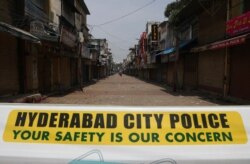Expatriate Indian doctors in Australia have formed an emergency group to help overwhelmed colleagues and relatives struggling with COVID 19 back home.
Also, in Australia, a special task force is urging the government to abandon what some have termed a “fortress approach” to the pandemic due to the country’s decision to keep international borders shut.
Settlers from India are Australia’s second-largest group of migrants behind those from England.
They have become a valuable part of society and the economy. Now expatriate medical professionals from India have come together to help their colleagues back home during the pandemic.
The Indian health system has been under immense strain because of an avalanche of COVID-19 infections and fatalities. The populous South Asian nation is at the heart of the global pandemic. The World Health Organization has reported 25 million infections and more than 270,000 virus-related deaths.
Indian migrant doctors in Australia are dispensing medical advice through phone lines and via the internet, about hospital treatment and drugs to help patients in India fend off coronavirus infections.
Yadu Singh is a cardiologist in Sydney and president of the Federation of Indian Associations of New South Wales state.
He says they are doing what they can to help anxious patients in India.
“We became the secondary doctors. We cannot prescribe medicines sitting in Sydney, but we were able to counsel them, stop them from getting panic and also to counsel them about what they should do to not pass on the infection,” Singh said.
Australia’s response to the pandemic has received global praise, but an alliance of education, migration and legal experts has said the nation risks being left behind if its isolationist approach to COVID-19 continues.
Australia banned foreign nationals in March 2020 to curb the spread of the virus and the government’s says international borders will not reopen until the middle of 2022. Critics, however, believe that Australia’s prosperity relies on re-joining an “open, globalized world.”
But prime minister Scott Morrison said not even mass vaccinations would allow Australia to reopen its borders sooner than he has planned.
“Even in that circumstance you are still talking about many Australians — millions of Australians — who would not have been vaccinated because a) they are children, or b) they have chosen not to be, and you are also making assumptions about what the rest of the world looks like with COVID at the end of this year with the introduction of new variants and strains,” Morrison said.
Almost 30,000 coronavirus infections have been diagnosed in Australia since the pandemic began, and 910 people have died, according to the latest government figures.
Australian citizens and permanent residents are allowed to return home, but numbers are limited because of capacity constraints in the mandatory hotel quarantine system.





